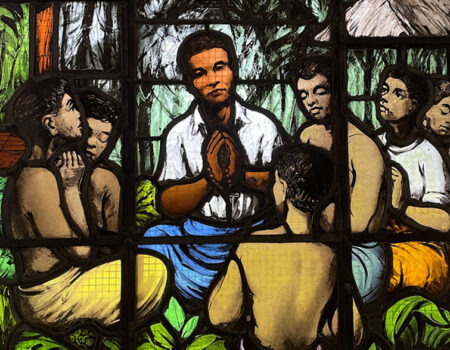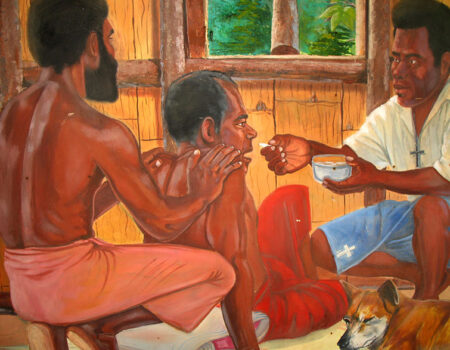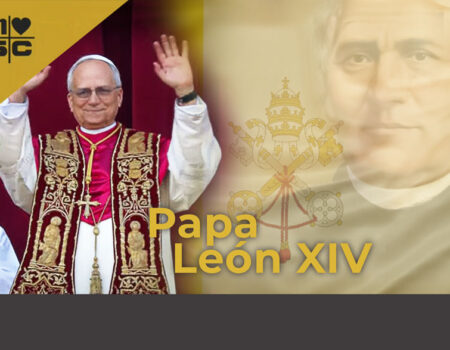Getting to know Jules Chevalier
Thursday April 25, 2024
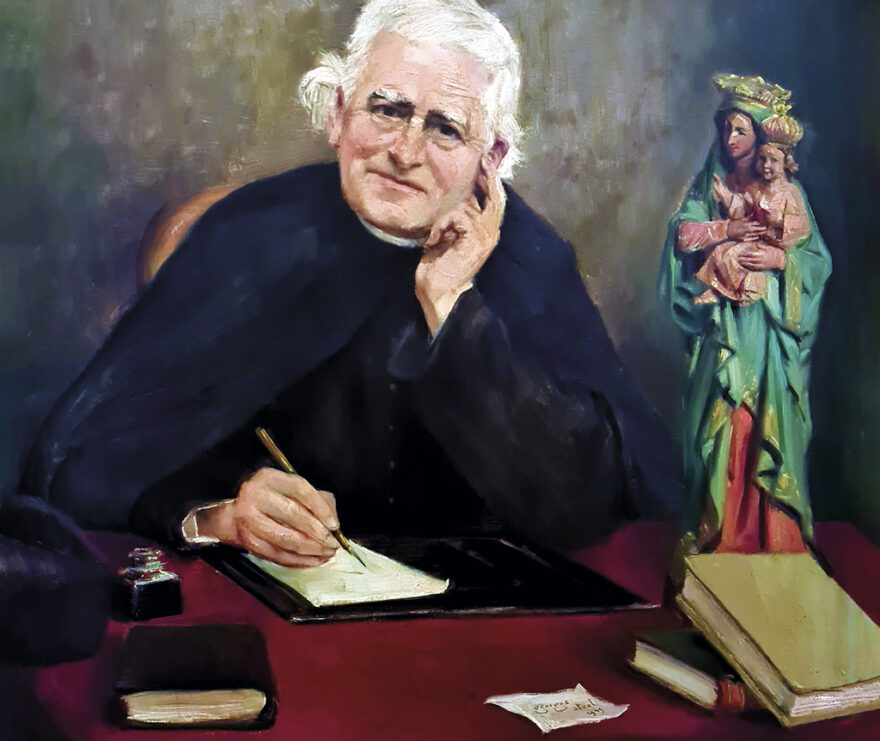
By letters from the founder and a little more.
We all know that our Founder wrote a lot. His books, letters, and sermons are abundant in our historical archives. Sometimes, wanting to read all his contributions at once takes time. That is why we present some of his phrases that, on the 200th anniversary of his birth, can help us reflect on his works, his person, his sense of being an instrument of the Spirit in the environment in which he lived, about how he dreamed of his work at the service of the Church and humanity. They are written from his culture; let’s look not for how he says it but what he wants to convey. What we present is not an academic work; it is just a small contribution to learn more about our “small society”, to love it more, and to admire the figure of the Founder even more. Reflecting on the 200th anniversary of the birth of Jules Chevalier, “a man with a mission”.
1. A Little History
1.1. The beginning of a foundational Charisma: this charism is the peculiar vision of Jesus in the Gospel. Jules discovered, lived, and announced it through the heart of Jesus as the revelation of God’s love, which is tender, compassionate, merciful, strong, and constant love.
· “The Heart of Jesus, the centre where everything in the Old and New Testaments converges, the pivot on which everything in Catholicism turns, the sun of the Church, the soul of our souls, the furnace of our love, the cradle of our holy religion, the source of our mysteries, the origin of our sacraments, the guarantee of our reconciliation, the salvation of the world, the remedy of our evils and the arsenal of the Christian. This is how I understand devotion to the Sacred Heart of Jesus; it encompasses everything, responds to everything.” (9-XII-1862)
· “Devotion to the Sacred Heart is the essence of Christianity and contains all other devotions. The Heart of Jesus is God, the love of God incarnate. God is love”. (1887)
· “Jesus is the first missionary of his Heart. He is the first to make men know his love for them. Everywhere, always, in all his actions, our Lord was concerned about the mission he came to fulfil on earth.” (1870)
· Although composed of diverse members, humanity forms nothing more than a single body, a single blood, ‘unum corpus multi sumus’. The heart that gives life to all the members of this body is the Heart of Jesus. He alone brings us together, and He alone unites us to God. The moment we separate ourselves from Him, we separate ourselves from each other, and with the divine life – whose source is He – we lose the true meaning of human brotherhood. This divine Heart is, therefore, the centre around which all hearts gravitate.” (1865)
· Two plagues corrode our unfortunate century: indifference and selfishness. An effective remedy applicable to these two evils is necessary. This remedy is found in the Heart of Jesus, which is love and charity. “Priests would be needed to work to make it known; they would bear the name of Missionaries of the Sacred Heart of Jesus.” (1856)
· “From the cradle to the cross, the strength and sweetness of Jesus appear in a very special way … As Missionaries of the Sacred Heart, we must bear the seal that marked Jesus with the qualities of kindness and strength … The Heart of Jesus “He has all the virtues we tend to admire the most, such as courage, strength, perseverance, generosity.”
1.2. An ideal
· “We had promised the Blessed Virgin that, if she listened to us, we would take the title of Missionaries of the Sacred Heart of Jesus and strive to make its beautiful and profound meaning true.” (9-XII-1862)
· “The small Congregation of the Sacred Heart is not man’s work but of God! “He was born in the Sacred Heart of Jesus under the powerful protection of Mary.” (1855)
· “The Congregation is not the work of men; you all know it as well as I do. You know its origin and the wonderful circumstances that accompanied it. It arises entirely from prayers to Mary, to the Heart of Jesus, the source of all blessing. It has driven our courage amid the efforts of hell and the thousand difficulties we faced. Only God knows their number and entity. It is also the cause of our unlimited confidence. Yes, heaven loves our little Congregation…” (No. 1852 Cir.)
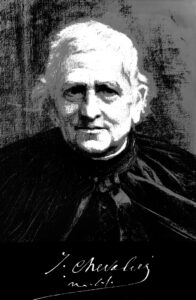
1.3. A historical path
· “Since then, the small mustard seed, which seemed suffocated among the brambles and thorns of our poor village, has germinated under the gaze of heaven and grows day by day, what will be its fate? It is the secret of the Heart of Jesus.” (9-XII-1862)
· “The undertaking may seem risky, but we have guarantees of divine blessing, and as long as the hand of God remains in us, trust is a duty. May the divine Heart of Jesus always shelter and protect the Congregation and grant us, among his favours, great fidelity to seek only that which can give him glory.” (1866)
· “When God wants work, obstacles are means for Him. According to her, he laughs at human wisdom: he confounds his predictions and calls to life what should never see the light of day. He develops and fortifies in fertility what she had condemned to die. The founding and development of the small congregation of Missionaries of the Sacred Heart are proof of this truth.” (1870)
· “It is my conviction that our Congregation is destined, in the designs of Providence, for great things and that it has a great future; but on the condition that it is not half-religious, but completely and without reservation.” (March 5, 1887)
· “You don’t have to be surprised by our religious imperfections. An oak takes many years to reach its perfection. It is already a lot for us to experience what we lack. In time, we will get there. I consider it a great blessing that our course is charted and that we know the path we must follow.” (March 30, 1887)
· “Let us not be more rebellious than Saint Peter! May our human prudence not oppose the will of the Master … Many of our works were established amid the greatest contradiction. A set of circumstances that seemed providential pushed us forward. Today, we see that the Spirit of God directs all things, and we congratulate ourselves.” (04-1-1881)
· “I see that in Rome, for example. Mons. Felipe and others have taken the habit of calling us Missionaries of the Sacred Heart of Issoudun. I protested. Force them to say Missionaries of the Sacred Heart of Jesus. It is our official title: we belong to the Holy Catholic Church, not Issoudun.” (01-II-1889)
· “Do not allow the true religious building that we want to build to be demolished by reckless criticism, by trickery … If we heed the complaints that the love of comfort, the lack of generosity and religious spirit can inspire, we would never end. We want to lead an essentially religious life; those who do not wish to do so will look for a more comfortable life elsewhere. It is not the number that strengthens a community but the quality of the strongly disciplined members. We desire, above all, true religious, animated by the spirit of prayer, self-denial, obedience and sacrifice. That is what will constitute our strength, attract serious subjects to us, and ensure the prosperity of our Institute, with the blessing of heaven.” (27-VII-1888)
· Union gives strength. With the precious elements at our disposal, let us confidently look to the future. Born from the Heart of Jesus, under the powerful auspices of Our Lady of the Sacred Heart, what can we fear? Are we not his favourite children, his chosen apostles? Has not her all-powerful and maternal protection over our Congregation been made visible from the beginning? Who could enumerate the maternal kindnesses of Our Lady of the Sacred Heart? How many wonders she has performed and performs every day on our behalf! Trust, then! Let us walk together in an intimate and cordial union! (5-VIII-1891)
· “Do not forget, dear friend, that we are Missionaries of the Sacred Heart and that our spirit must be a spirit of sweetness and charity, piety, submission and great mercy. We will form souls better and win them better with kindness than inflexible severity. Discite a me qui mitis sum et humilis corde.” (26-02-86)
· “If you do not want to see our beloved Congregation founder or vegetate, it is time to listen and give satisfaction to those who complain. Direct your efforts towards the true religious spirit, discipline, mortification, observance of the rules and fulfilment of the three vows. The more serious our Congregation is … the more the Sacred Heart will bless it, and the more vocations will multiply.” (24-II- 1906)
· “Persecution, like poverty, is a blessing. Far from complaining, let us rejoice, like the Apostles, for having been considered worthy to suffer for and with our divine Master.” (13-IV-1906)
· “Where have you heard, Fr. Meyer, that Religious Orders cannot be reconstituted? He forgets, consequently, that the life of perfection is an essential part of the Holy Church.” (13-IV-1906)
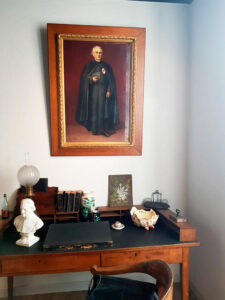
2. With a Spirituality from the Heart
2.1. Congregational spirituality is living and practising the peculiar vision of one’s own Charisma. For us, it is a spirituality of the heart. Father Cuskelly, in his book on Jules Chevalier, in chapter 5, points out the following characteristic notes of our spirituality of the Heart: a sense of mission, called to offer the richness of love and mercy of the Heart of Christ everywhere, being strong, constant and bold (in the words of the current Pope Francis: close, tender and merciful); with obedience in fraternal charity (sense of community belonging); aware that true love carries with it a dynamic of personal renunciation, (in the words of Saint John Paul II: to love is to put the ‘you’ above the ‘I’, the self); with a special devotion to Mary under the invocation of Our Lady of the Sacred Heart; living the mystique of love for the total Christ, (with a spirit of synodality and liberation from sin and its consequences: reparation).
Jules Chevalier was not an intellectual, but he lets us perceive what Cuskelly synthesised in his letters.
2.2. · “I conjure my beloved brothers to always be faithful children of the Chair of Peter and of his supreme Head, whose judgments are irreformable; to live among themselves the most cordial and perfect union, to have great respect for authority in general and for their superiors in particular, to practice obedience to the point of heroism, to renounce their own will, their personal judgment, to submit in everything and willingly submit to the wishes of those who have the right to command them; to practice interior and exterior mortification, to generously embrace sacrifice to the point of self-immolation, to never back down from the cross that heaven imposes on them, to seek in everything nothing more than the will of God, his glory and the good of souls; to flee from vanity, the search for oneself and one’s own comforts, to fortify oneself in a great spirit of faith, in distancing oneself and fleeing from the world; to observe with inviolable fidelity their Constitutions and Rules, mainly everything concerning the three vows of religion. I implore on my knees the various superiors of the Congregation for exact observance of all these points.” (1st Spiritual Testament, January 25, 1881)
· “Religious spirit is, above all, esteem for one’s vocation. Adhesion to something is a function of appreciation. There are numerous reasons for appreciation, esteem and love for the vocation. First of all, a grace of election by being called to the service of God … the fact of having been called to religious life in a Congregation dedicated to the Heart of Jesus … chosen with the mission of being his missionaries and extending his kingdom throughout the world. The religious spirit does not consist only of this but also of the obligation to strive for perfection always, in everything and everywhere. It is the proper purpose of our state. Whoever forgets it, more than a useless member becomes dangerous due to bad example …” (No. 2577. Cir.)
· “Let us make ourselves worthy of new favours by our piety, self-denial, observance, spirit of discipline, and obedience to the Constitutions. If we are what we should be, Heaven will bless the little Congregation, which has a great future before it.” (24-XI-1904).
· “May they always be united to each other by ties of intense charity. Division within a society leads to ruin, says the Lord. It is, therefore, necessary to avoid, at any cost, this misfortune.” (1904. Testament).
· “The MSC, constituting nothing more than a single family, must first and foremost live and work for the Congregation that formed them and not for the various nationalities.” (No. 1966. Cir.)
· “They are blinded by the critical spirit, which is the ruin of communities…” (27-VII-1888)
· “Science is dangerous without mercy, but with it, science converts and saves souls. Convinced of this truth, far from boasting about the knowledge they have acquired, they will boast with the Apostle that they only know Jesus crucified; “Like the example of the Saints, they will learn more at the foot of the cross than in books.” (1857)
· “Science without mercy is deplorable.” (11-02-1881)
· “A religious person who refuses to participate in the progressive development of human knowledge would create fatal gaps in his formation. But what is science without mercy? A resounding cymbal. Therefore, the Missionary of the Sacred Heart must become a man of faith and sacrifice.” (1901)
· “It seems that you pay little attention to the habitual violation of the rules and the responsibility incurred. The ruin of the religious spirit and communities always begins there. We will never do enough, especially today, for their exact observance and to inspire sufficient respect for them.” (27-VII-1888)
· “You know, as I do, that older religious often have a greater need than young people to be called to order.” (27-VII-1888)
· “May the spirit of poverty reign among them, fleeing from vanity, luxury, superfluity, useless expenses. Being content with what is necessary in all things.” (1904)
· “May we realise the greatness of the ministry entrusted to us! ‘May the Sacred Heart of Jesus be loved everywhere.’ To provide an effective remedy to modern societies, which are sliding into the abyss of impiety, our Lord Jesus Christ presents his Most Sacred Heart to men. And we are the ones sent to apply this remedy to the world.” (1900)
· “We only need true missionaries, pious, zealous, obedient and truly apostolic men.” (19-XI-1889)
· “Our missions abroad and among the infidels have great importance. They are the purest glory of our Institute. The Major Superiors will have to try to send them only chosen, pious, judicious, observant men with uncompromising dedication and inviolable affection towards the Congregation. “Inconstant, versatile, adventurous characters introduce disorder.” (No. 2665, Testament)
· We have proposed to walk in the footsteps of Jesus Christ, imitate his virtues and strive towards perfection daily through the constant practice of the three vows of poverty, obedience and chastity. We have stripped ourselves of ourselves to put on Christ crucified. And if we want to maintain these dispositions, we must preserve the religious spirit until the end of our life under penalty of perjury.” (1887)
· “Persecution, like poverty, is a blessing. Far from complaining, let us rejoice, like the Apostles, for having been considered worthy to suffer for and with our divine Master.” (13-IV-1906)
“Great charity must reign in the community. Respect each other. Treat each other with kindness and cordiality; avoid everything that tastes of affectation and sufficiency; never seek to dominate or shine. Strive to practice the virtues of the Heart of Jesus: his meekness and humility.” (1855)
· “Without a doubt, we have before us a beautiful future with the Sacred Heart of Jesus as a point of support, but it is necessary to know how to take advantage of it. To do so, we must be selfless, disciplined, obedient men of study and prayer. How far we are still from it! It is time to react and have true religious worthy of this name. Let us ask the Sacred Heart and Our Lady to come to our aid, and if we succeed, we will do wonders.” (1896)
· “Among the members of the small community of the Sacred Heart of Jesus, the greatest charity and the most perfect union will always reign. Affability, humility, obedience, the spirit of poverty, zeal and self-denial will be his endowment.” (1855)
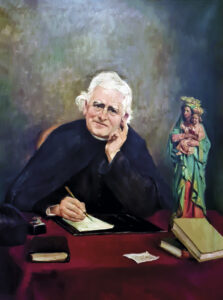
2.3. An expression of Julio Chevalier is: “obedience in fraternal charity.” It is a way of living love in a community where each of the members has a mission to carry out in a “common union.” The Constitutions remind us that we must all support each other in spiritual and human growth to carry out the mission effectively. They remind us of the principles of subsidiarity, co-responsibility, inter-responsibility, animation and union. In the last General Chapter (2023), the theme of congregational internationality was added. Jules frequently wrote about the mission of the Superior in this conception of obedience in fraternity that excludes despotism, dictatorship and believing oneself to be master and lord in the work to be carried out according to the mission entrusted, with an attitude of listening to discern with the brothers of the community what God’s will is for them.
· “Those who enter our Congregation can allow others to surpass them in science, in mortification, in poverty; but they will not allow themselves to be defeated in obedience in fraternal charity.” (1869)
· “Obedience and humility must be the capital virtues of the Congregation because they are those of the Heart of Jesus.” (1857)
· “In the Congregation no one is a stranger, nor an upstart, but all are brothers in the Heart of Christ.” (1897)
· “We have had Superiors of ‘ama et fac quod vis’ (love and do what you want). With this principle, some have been a cause of ruin for many and an extreme weakening of religious observance. If we continue down these paths it will be the loss of vocations. You have to take men as they are. They need to feel vigorous discipline. Only in this way can regularity and virtue be maintained…” (07-04-1880)
· “I think it is wise on the part of superiors and typical of good administration to think about the future and prepare for it, without compromising the present, that is, especially when Providence seems to lead the way.” (26-02-1884)
· “Accept only safe vocations. It is much better to have fewer, but they are good. Never focus on the number; otherwise, you will have troublesome spirits that will make the Congregation tremble. And when you realise that a religious person is not suitable, do not hesitate to fire him. It is necessary today that discipline be firmer than ever and that obedience be practised by all. Obedience is the touchstone! (León XIII to Julio, Cfr. Nº 1966. Cir.)
· “He complains about some novices who are not very intelligent and weak in health. Why keep them so long? They then constitute a big nuisance, and we don’t know what to do with them after having cost us so much money. It is not advisable to be so condescending. Good intelligence and excellent health are required. Be severe. Never admit to the vows of those docile and sensual natures that do not want to correct themselves. The Spirit of piety and interior does not usually ally itself with these characters. It requires true piety, blind obedience, generosity, and a spirit of mortification. Pauca sed bona” (few but good). (03-01-1885)
· “The missionary must radiate unwavering faith and perfect trust in God so as not to allow himself to be carried away by discouragement in setbacks and problems, and not to lose heart in the face of the difficulties he encounters in his work.” (1855)
· “As far as possible, the Superior will never make his brothers feel the weight of his authority; he will not treat them in a domineering manner but with kindness, sweetness, charity and cordiality.” (1855)
2.4. We know the filial devotion of Jules Chevalier towards the Mother of Jesus. Something maintained by all of us throughout our history. We cannot deny that in several places, we are known more by it than by our title.
· “We recognise her as our founder and sovereign. We will associate her in all our works and make her loved in a particular way.” (1856)
· “Do not forget that He was given to us by Mary, that God wanted Him to take His life from the most pure heart of the Virgin, His Mother; that she is, furthermore, the mysterious channel through which graces reach us. Through her, then, and in union with her, you must go to the Heart of Jesus. Sure of pleasing Jesus, call his Mother: Our Lady of the Sacred Heart. (1863)
· “We will put our effort into making Mary loved … to make known to the people her powerful intercession with God and her tenderness towards human beings.” (1855)
· “This title of Our Lady of the Sacred Heart contains a deep meaning: It wants to show that Mary, on the occasion of her divine Motherhood, has a great influence on the Heart of Jesus, and it is through her that we must walk towards the Heart of your son”. (1857)
· “Like Mary, we have made known in all simplicity our notorious insufficiency and our legitimate concerns. Since, despite this sincere manifestation, you tell us like the angel: ‘Do not fear anything, accept the offer that is made to you, the Spirit of God will be with you and the power of the Most High will overshadow you’, we bow with respect, and our humble Congregation responds with the Virgin of Nazareth: ‘Behold the handmaid of the Lord, let it be done to me according to your word.’ And with Saint Peter: ‘In your word I will cast the net.’ (1881)
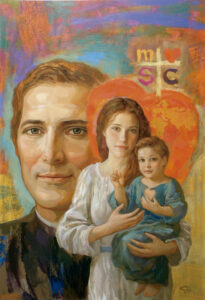
3. About His Person
3.1. We know that Jules Chevalier rarely talks about himself. We present texts to help us enter his interior and value him even more.
3.2. · “I even try to go further and recreate myself, like Saint Paul, in the trials and find my consolation in the cross. I know that the works of God are only founded on Calvary and suffering. This thought strengthens me.” (14-02-1866)
· “I wholeheartedly forgive my enemies, if I have had any, those who have sought to hurt me with their words or actions, anyone who has responded to my dedication, my benefits, with ingratitude or slander. My soul is free of any resentment.” (1st Spiritual Testament, January 25, 1881)
· “I do my duty. If your opinion remains the same, I will resign within eight days.” (to his advisors, 26-02-1884)
· “If things continue like this, it is advisable a thousand times to abandon the parish and be content with a modest position, where religious life can be carried out seriously …” (17/05/1889)
· “Do not admit those who are sick, those who lack sincere piety, those who lack judgment. These subjects are more harmful than useful to the Congregation. Sooner or later, they become a serious nuisance and serve as a bad example. It is preferable to have less and to be excellent religious, pious, edifying, obedient to the point of sacrifice, who renounce their own will and are willing to do anything and go wherever the Superiors send them.” (20-IV-90)
· “It causes me great pain, dear friend, to say that I abandon him, to me who, on the contrary, always support him, justify him and always take his defence in all things; to me who praise you in all circumstances, your zeal to all proof, your limitless love for the Congregation, your adherence taken to the point of heroism, etc. To me who look at you as another self, in which I rest with perfect security. To me who have no secrets for you, to whom I entrust our fears, our hopes, my most secret thoughts. Please, I beg you, do not doubt me anymore … and do not be sad from now on for things that do not exist or that are not against you. (3-XII-90)
· “Our personal union with Jesus surpasses all imagination. It is not only a union through imitation and love. It is making us one with Him. The complete Christ is made up of Him and us.”
· “If we do not fully live the life of the Heart of Jesus, we must consider ourselves unworthy of the name of Missionaries of the Sacred Heart… Those who assume the glorious name of Missionaries of the Sacred Heart can consider themselves worthy of it only to the extent that they have managed to bring the very life of the Heart of Jesus.”
· “It is true that my life is far from being that of a contemplative; But tell me, who can know how I spend my nights after 10 p.m., or what I do when, for 20 years, I get up at 4:30 in the morning? Furthermore, who can know what are the inner feelings that animate me during the long hours that I spend morning and afternoon in the temple? (28-01-1891)
· “A great spirit of prayer and good example must be evident in the missionary. With this, it will produce more fruit than with all the science and eloquence that could be used … Let us apply ourselves carefully to prayer so that it may be our supreme delight, considering it as the most precious moment destined for our conversation with God. (1855)
· “There is a need for men imbued with a spirit of prayer and apostolic zeal, willing to give everything and give themselves in favour of their brothers. Let us be like this, beloved brothers, and then we will be true apostles of the Most Sacred Heart of Jesus.” (1900)
· “I can assure you, before God who knows me, that I have had no other objective in everything I have done than to seek his glory and the good of others. He would have preferred death a hundred times over doing something solely for human reasons. I affirm that I have always sought the Kingdom of God and the justice of it.” (1891)
· “We have no other purpose than to make his love known everywhere … Being a Missionary of the Sacred Heart means being an apostle of the love of Jesus.”
· “As modern societies enter a new phase, it is necessary that we find new ways of fighting and combating that respond to their needs” (1887)
· “We believe that we can affirm with complete certainty that Our Lady of the Sacred Heart will never stop protecting our Congregation if we are faithful to her.”
Conclusion
You have in your hands more than seven dozen texts by Jules Chevalier. Two hundred years after his birth, they can be a means to return to the sources. Leaving aside literary styles and cultural expressions of a time, yours, let us try to discover and live what the Spirit transmits to us through Him.
The ways are from yesterday, the message from today; the style is of its time, and the dynamic inspiration of the Charisma, Spirituality and Mission of the Missionaries of the Sacred Heart is for today.
Joaquín Herrera, msc



